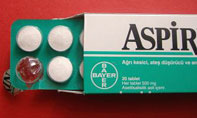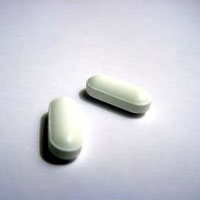- About Us
- Columns
- Letters
- Cartoons
- The Udder Limits
- Archives
- Ezy Reading Archive
- 2024 Cud Archives
- 2023 Cud Archives
- 2022 Cud Archives
- 2021 Cud Archives
- 2020 Cud Archives
- 2015-2019
- 2010-2014
- 2004-2009
 |
Book Review "Aspirin: The Story of a Wonder Drug", Diarmuid Jeffreys, 2004 |
Recently I hosted a barbecue to celebrate my 25th trip around the sun. A friend rang me a few days before the event and asked if she could bring anything. I replied that she should only bring her appetite. She then asked me what I wanted for a gift. I am not a very conscientious gift-giver, and I certainly don't expect them in return. Receiving them makes me anxious and mildly ashamed for some reason, probably because I am afraid that somebody will remember what I didn't give them for their last birthday. I told her not to bother, but she insisted. So finally I submitted that I would really appreciate a good book, for it had been a considerable time since I had read anything that had interested me much. When she asked me what kind of book I might like I was hardly helpful. "I dunno, something good."
 As I hung up the phone I began to have some uneasy thoughts. I often browse the Kinokuniya bookstore in the city during my lunch hour. This store is so vast that one might reasonably assume that about half the population of the world must have had something published at one time or another. It is difficult to comprehend how many people have written to fill the space, or how many others have toiled in vain to capture but one spine-width of shelf. In a place like this one cannot escape the sensation that they are surrounded by vast human suffering. It is in many ways similar to walking amongst tombstones in a large cemetery, and somewhat spiritual. Yet it is rare that I find myself stumbling across anything of any interest here. If I could not find something of particular appeal in a place like this, how would my friend find something to suit my taste?
As I hung up the phone I began to have some uneasy thoughts. I often browse the Kinokuniya bookstore in the city during my lunch hour. This store is so vast that one might reasonably assume that about half the population of the world must have had something published at one time or another. It is difficult to comprehend how many people have written to fill the space, or how many others have toiled in vain to capture but one spine-width of shelf. In a place like this one cannot escape the sensation that they are surrounded by vast human suffering. It is in many ways similar to walking amongst tombstones in a large cemetery, and somewhat spiritual. Yet it is rare that I find myself stumbling across anything of any interest here. If I could not find something of particular appeal in a place like this, how would my friend find something to suit my taste?
When she presented me with Aspirin I was pleasantly surprised. I had expected something that I had seen before and had not anticipated a non-fiction work.
This historical narrative follows aspirin from its first known uses in ancient quack medicines through the industrial age and onto the pharmacy shelf. Much of the book is concerned with the events of the late 19th and early 20th centuries, a time of great civil and economic change, which helps sustain a healthy narrative pace. Jeffreys also manages to serve up many satisfying morsels of trivia, and shifts the focus of action often enough so that no event or single person overpowers the importance of the subject. For those who like to throw useless facts and figures about the place, there is no shortage of fodder at hand in Aspirin. Although nit'pickers be warned, at least one anonymous web reviewer at www.artbookreviews.comargues that some of the medical detail is misleading, particular to the statistical analysis of clinical trials that suggested aspirin helps fight heart disease. Apparently it doesn't work as well as some studies suggest.
The attraction of this book is that the author is considerably less important than the story he is telling, and he knows it. Jeffreys' style is neither ebullient nor overbearing like many popular historical commentators, and he capably explains detail in concise terms. The author's time at the BBC as a documentary producer is evident in his editing, which cuts from scene to scene with perfect timing, if not perfectly logical flow. Although I can imagine others being annoyed by many variations of place and time, it is never difficult to find one's way back to the main thread of the action.
 Aspirin also has great appeal to the generalist. It investigates several subject areas from organic chemistry, pharmacy and medicine, to global industry, marketing and economics. Jeffreys' thesis that the rise of aspirin was due to the chance interaction of all these forces is plausible and could apply to most products of modern times, which makes this a study of an age rather than a product within it.
Aspirin also has great appeal to the generalist. It investigates several subject areas from organic chemistry, pharmacy and medicine, to global industry, marketing and economics. Jeffreys' thesis that the rise of aspirin was due to the chance interaction of all these forces is plausible and could apply to most products of modern times, which makes this a study of an age rather than a product within it.
Whilst I would not recommend Aspirin to the High Priestess of Literature, it is compelling reading for the everyman or the documentary fan, and would certainly make a great gift.
Aspirin: The Story of a Wonder Drug by Diarmud Jeffreys (Bloomsbury 2004) is probably available at your local bookstore, although since I didn't buy it I don't really know. You could always try Kinokuniya.
